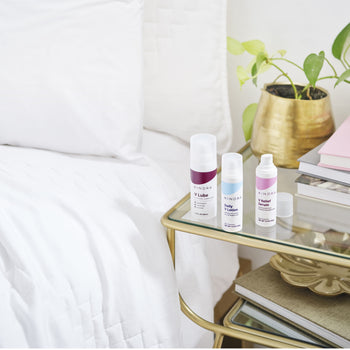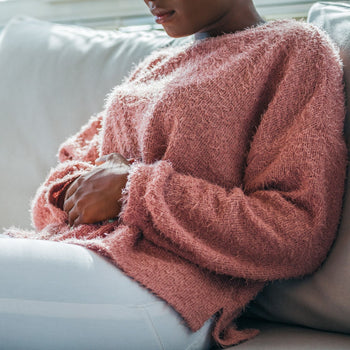We're about to tackle a sensitive topic: Vaginal itching. Though extremely common in women of all ages, especially those who are experiencing their menopausal transition, it remains one of the most taboo topics in women's health. But, there is nothing to be ashamed of. Here we will dispel myths, break stigmas, and provide insight on how to solve this common challenge in the menopause experience.
Common Causes of Vaginal Itching
Vaginal itching, particularly during the midlife evolution, is often linked to vaginal dryness. During menopause, estrogen levels are lower. This drop in estrogen production causes vaginal walls to become thin and dry; sometimes triggering irritation. This estrogen-induced vaginal itching isn't just for those experiencing menopause. Women who are breastfeeding are also subject to fluctuating hormone levels as well, especially estrogen production. Those who have received certain cancer treatments or had a hysterectomy are also subject to fluctuating estrogen levels and may also be experiencing irritation. If this sounds familiar, you might want to try our V Relief Serum. Our new serum is formulated with a biomimetic peptide clinically studied to reduce skin sensitivity and reactivity, including stinging or burning.
V Relief Serum
For those who aren't experiencing vaginal dryness, there may be some irritants causing the discomfort. For example, feminine sprays, douches, condoms, lubricant, bubble baths, fabric softeners, soaps, scented toilet paper, and laundry detergents all include ingredients that can irritate the vagina and vulva. This is definitely a wide list of products to go through, but take a peek at the ingredients in what you're using. Try eliminating those that aren't absolutely necessary (i.e. feminine sprays, douches, bubble baths) and see if that helps alleviate symptoms. Douching in particular can be especially bothersome for the genital area. The vagina is self-cleaning and doesn't need to be douched, so definitely consider omitting this step in your self-care routine if it applies to you! If vaginal itching is persistent, consider swapping out your laundry detergent for an unscented formula formulated for sensitive skin. Keep in mind that allergic reactions to these household items are common, so being mindful of ingredients and your body's triggers will help keep you itch-free. If discomfort persists and you're not breastfeeding and aren't on you menopausal journey, consult your women's health expert for more support.
Lichen sclerosus is a condition that can also cause genital area irritation. It can affect any age group but more typically affects postmenopausal women.It is a chronic condition that causes thin white (often depigmented) patches of skin in the vaginal area. It is regarded as a genetic condition and has been linked to some immune disorders. Itching isn't the only challenge this condition brings - it also can cause easy bruising, cracking and tearing of the skin and can even leave permanent scarring. Be sure to consult your gynecologist if you think you may have lichen sclerosus. They can prescribe a topical corticosteroid ointment to treat the condition and ease itching.
There are some more skin conditions that can cause vaginal itching. Psoriasis is a condition that is often talked about yet is seldom spoken about when it comes to the genital area. Genital psoriasis is caused when your immune system accidentally attacks healthy cells. It does have a genetic link and some common triggers include infections, skin injuries, smoking, heavy drinking, cold weather, and stress. If this sounds like it applied to you, be sure to see your health care provider to receive a prescription topical cream.
Sexually transmitted diseases (STDs) and sexually transmitted infections (STIs) can also be a common trigger for vaginal irritation. Chlamydia, gonorrhea, and herpes all can cause uncomfortable itchiness. If you're experiencing a burning sensation when urinating, have genital warts, or have abnormal vaginal discharge, be sure to see your ob/gyn for an exam and STD/STI test. Each of these conditions do have treatment to help manage symptoms, however none are over-the-counter, so an appointment with a healthcare provider is a must.
Key Signs of Yeast Infections and Bacterial Vaginosis
Yeast infections and bacterial vaginosis are two other common culprits of vaginal itching. A yeast infection is usually identified by abnormal vaginal discharge that resembles cottage cheese. Bacterial vaginosis is identified by thin gray, white, or green vaginal discharge. Both of these conditions cause burning while urinating and irritation in the vulva and vagina. Candidiasis is a fungal infection caused by a type of yeast called candida. This is a type of yeast infection. It carries similar symptoms as other yeast infections, with pain during sex, vaginal itching, and abnormal vaginal discharge being key indicators. Tablets and suppositories are available for treating yeast infections, though it is a good idea to see your gynecologist, to identify if an antifungal treatment is needed. There is no recommended over-the-counter treatment for bacterial vaginosis at this time, so you'll need to schedule a time to meet with your healthcare provider.
Options for Relief: Over-The-Counter Formulas & Home Remedies
We know the feeling - when you need relief, you need it fast. There may be a long wait for a doctor's appointment or maybe even just 4 days feels like an eternity with this kind of discomfort. We're here to share some options for relief!
First up, we've got our V Relief Serum. Please take note that this formula is specifically designed for vaginal or vulvar discomfort stemming from fluctuating levels of estrogen. We offer free shipping and fuss-free returns to keep the shopping process as easy as possible! Coconut oil is another recommended home remedy, which that also happens to be a main ingredient in our vaginal serum and is even more effective paired with Vitamin E.
Cotton underwear is another easy solution for relief that applies to any of the aforementioned conditions. Make sure your underwear isn't too tight, as that can cause further itching and irritation. If yeast infections are your concern, a bit of apple cider vinegar in a warm bath can help. Be sure to avoid hot baths and showers in general, as they strip the skin of essential oils which can cause overall discomfort, especially in the genital area.
Our Promise to You
Women's health doesn't need to be an isolating experience. We believe that our evolution is beautiful and our gained wisdom is a cause to come together. We created a Facebook group for women experiencing their menopausal transition to discuss any and all things - from soothing vaginal dryness to enjoying intimacy in menopause and beyond, no topic is too taboo. Join us!
The Menopause Quiz
Sources:
https://www.webmd.com/women/qa/how-can-menopause-cause-vaginal-itching-burning-and-irritation
https://www.medicalnewstoday.com/articles/322587
https://www.webmd.com/skin-problems-and-treatments/psoriasis/genital-psoriasis-guide#1
https://www.cdc.gov/fungal/diseases/candidiasis/genital/index.html
https://www.healthline.com/health/womens-health/itching-vagina-home-remedies#coconut-oil
NOTICE: KINDRA DOES NOT PROVIDE MEDICAL OR HEALTH CARE ADVICE. OUR EMPLOYEES AND OTHER REPRESENTATIVES ARE NOT PHYSICIANS OR HEALTH CARE CLINICIANS. YOU SHOULD CONSULT YOUR PERSONAL PHYSICIAN FOR ANY MEDICAL AND/OR OTHER HEALTH CARE ADVICE BEFORE ACTING ON ANY INFORMATION PROVIDED BY KINDRA OR ANY OTHER SOURCE
https://www.webmd.com/women/qa/how-can-lichen-sclerosis-cause-vaginal-itching-burning-and-irritation
https://www.medicalnewstoday.com/articles/322587
Continue the Conversation
Leave a Reply
Tags: Anxious body Connection Dry Skin Low Sex Drive Managing my Hormones Moody & Irritable Painful Sex Physical Well-Being Stressed Vaginal Dryness
















Thanks for sharing!
— Afshan